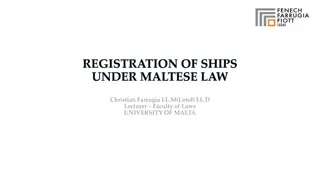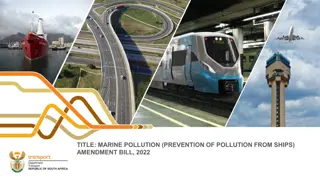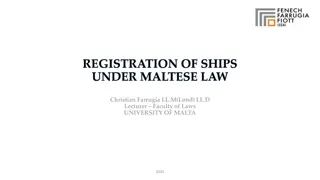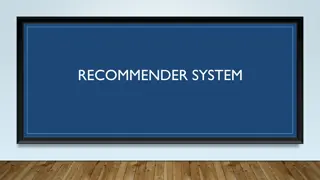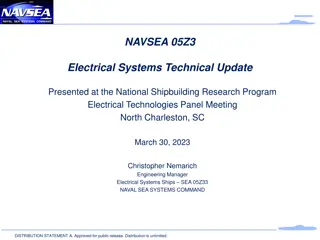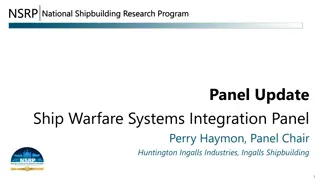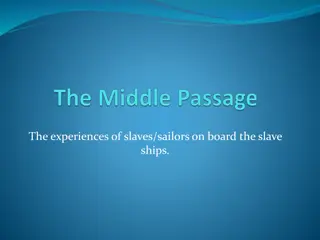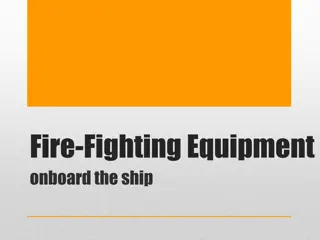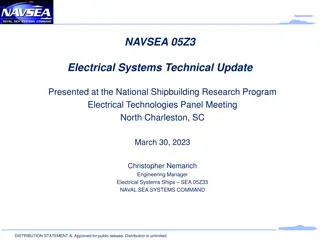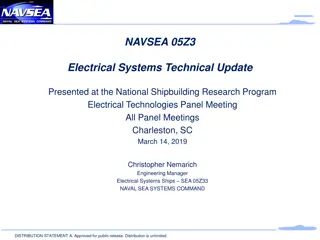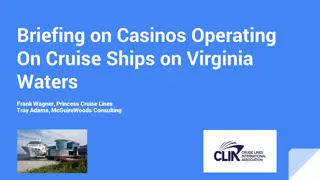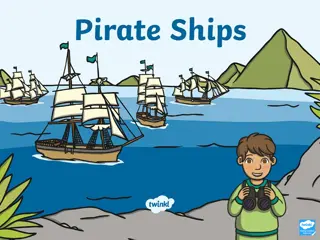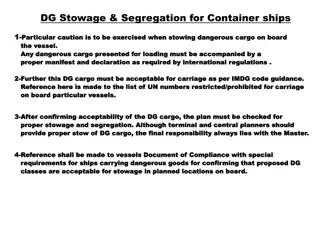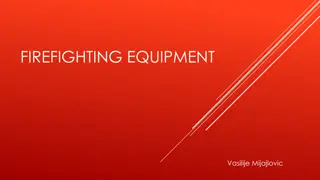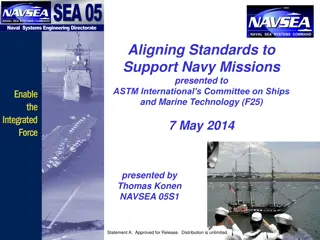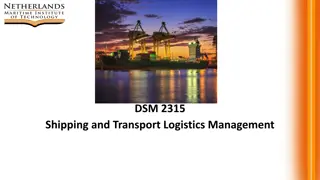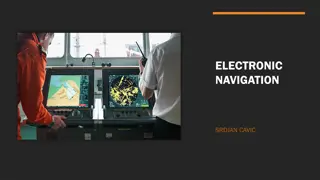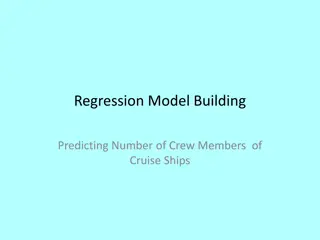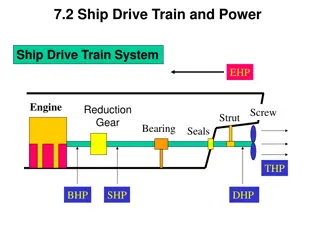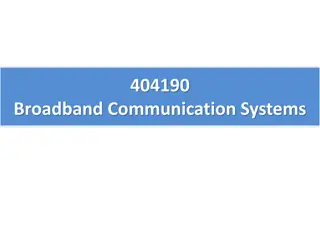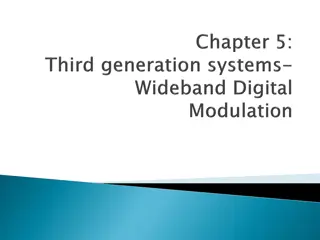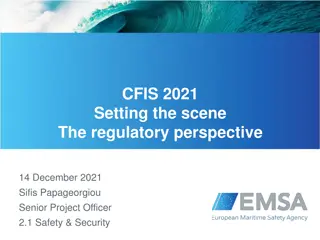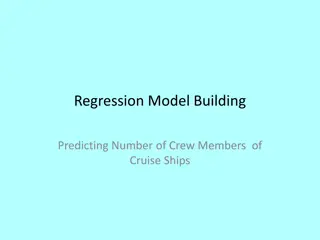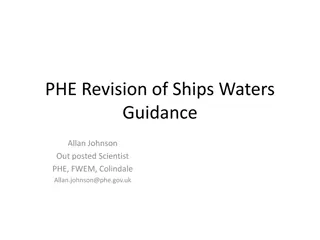Ship Classification and Design Factors Overview
Explore the categorization and classification of ships based on usage and support type. Delve into the factors influencing ship design such as size, speed, payload, range, seakeeping, maneuverability, stability, and special capabilities. Learn about the various methods of ship classification, includ
6 views • 104 slides
REGISTRATION OF SHIPS UNDER MALTESE LAW
Explore the comprehensive process and legal framework for the registration of ships under Maltese law explained by Christian Farrugia, LL.M, LL.D. Learn about the registration of assets, ship nationality, ownership requirements, eligible vessels, and the registration process. Understand the signific
2 views • 21 slides
Overview of Distributed Systems: Characteristics, Classification, Computation, Communication, and Fault Models
Characterizing Distributed Systems: Multiple autonomous computers with CPUs, memory, storage, and I/O paths, interconnected geographically, shared state, global invariants. Classifying Distributed Systems: Based on synchrony, communication medium, fault models like crash and Byzantine failures. Comp
9 views • 126 slides
Marine Pollution Prevention Amendment Bill Overview
The Marine Pollution (Prevention of Pollution from Ships) Amendment Bill aims to incorporate MARPOL Annex IV and Annex VI to regulate sewage treatment, reduce marine pollution, and address ship energy efficiency and GHG emissions. The bill seeks to enhance environmental protection by restricting sew
5 views • 15 slides
Understanding Information Systems in Organizational Management
Management in organizations is divided into three levels: operational, tactical, and strategic. Each level requires different information systems to support various activities. Operational systems focus on routine transactions and control processes, while middle-level systems aid in semi-structured
9 views • 39 slides
Exploring the Legal Framework for Ships and Aircraft in Civil Law Countries
Delve into the legal provisions governing ships and aircraft in Civil Law countries, focusing on obligations, property rights, security trusts, and lawful causes of preference. Discover how these regulations attract maritime and aviation industries and contribute to economic growth by establishing a
1 views • 61 slides
Ship Registration Under Maltese Law: Overview and Requirements
This informative content delves into the registration of ships under Maltese law, covering topics such as the types of assets that can be registered, the importance of nationality for ships, who can register a ship in Malta, what types of vessels are eligible for registration, and the three types of
1 views • 20 slides
Understanding Different Types of Recommender Systems
Recommender systems play a crucial role in providing personalized recommendations to users. This article delves into various types of recommender systems including Collaborative Filtering, Content-Based, Knowledge-Based, and Group Recommender Systems. Collaborative Filtering involves making predicti
0 views • 7 slides
Update on NAVSEA Electrical Systems Technical Initiatives
This update covers various technical initiatives and priorities related to electrical systems in the maritime industry, focusing on standards, specifications, and projects supported by NAVSEA. It includes information on circuit breaker obsolescence, flame resistance testing, cable transits, sealants
1 views • 18 slides
Update on Ship Warfare Systems Integration Panel
The Panel Update on Ship Warfare Systems Integration, chaired by Perry Haymon from Huntington Ingalls Industries, discussed various topics including false deck updates, fusion splice enclosures, and extension basis for POA enclosure systems. Anti-trust rules were also highlighted regarding discussio
1 views • 11 slides
Introduction to Embedded Systems Design
Embedded Systems Design, Chapter 1 provides an insightful overview of embedded systems, distinguishing them from general-purpose computers. The chapter delves into the characteristics of embedded systems, their design considerations, and the various types of embedded computers such as general-purpos
1 views • 7 slides
Exploring the Harrowing Experiences of Slaves and Sailors on Board Slave Ships
Delve into the contrasting experiences of slaves and sailors aboard slave ships during the Middle Passage. Learn about the fears, conditions, control dynamics, and potential outcomes faced by individuals on these voyages. Engage in activities, discussions, debates, and games to deepen understanding
0 views • 11 slides
Essential Fire Fighting Equipment Onboard Ships
Ships are equipped with essential fire-fighting equipment such as fire pumps, hydrants, hoses, extinguishers, and more. Fire pumps play a crucial role in supplying water at high pressure to the sprinkler system. Fire hydrants provide access to water for firefighting, while fire extinguishers are use
0 views • 7 slides
Understanding LRIT System for Ship Identification and Tracking
LRIT (Long Range Identification and Tracking) system enables global identification and tracking of ships for security purposes. Ships equipped with LRIT system can autonomously transmit ship data to authorized authorities. LRIT system is mandatory for certain types of vessels as per SOLAS convention
0 views • 12 slides
NAVSEA 05Z3 Electrical Systems Update Summary
Update on NAVSEA 05Z3 electrical systems presented at the National Shipbuilding Research Program. Includes details on standards, specifications, high-priority items, projects, and technical updates related to electrical systems in ships. Emphasis on initiatives, priorities, and ongoing efforts to ad
0 views • 18 slides
NAVSEA Electrical Systems Technical Updates Summary
Updates to electrical systems standards for surface ships and submarines have been presented, including revisions to MIL-STD-2003 and related projects. Changes to mounting fastener requirements, material selections, and electromagnetic shielding practices are covered. Distribution statements indicat
0 views • 15 slides
Casino Operations on Cruise Ships in Virginia
Virginia's waters see an increasing number of cruise ships with major lines like Carnival, Norwegian, Royal Caribbean, and Princess visiting Norfolk. These cruise lines adhere to strict regulations set by the Cruise Line International Association (CLIA) to ensure a safe and enjoyable gambling experi
0 views • 10 slides
Exploring Types of Pirate Ships and Their Components
A comprehensive guide to the various types of pirate ships, including the Sloop, Schooner, Brigantine, and Square-Rigger, each with unique characteristics and uses. Discover the key parts of a pirate ship such as the flag, sail, mast, stern, rigging, bow gun, and port. Dive into the rich history of
0 views • 4 slides
Strategic Trends and Quotes on Arctic Geopolitics
Strategic trends in deep-sea bed improvements and foreign ships in the US Exclusive Economic Zone (EEZ) are analyzed, highlighting untapped opportunities and geopolitical challenges, especially with foreign ships bartering agreements. The quotes from Admiral Caudle of USFFC emphasize the strategic i
0 views • 4 slides
Proper Stowage and Segregation of Dangerous Cargo on Container Ships
Exercise caution when stowing dangerous cargo on board container ships. Ensure compliance with international regulations, IMDG code guidance, and vessel-specific requirements. Verify stowage and segregation of dangerous goods, manually check for compliance, and adhere strictly to segregation require
0 views • 13 slides
Legal Aspects of Ship Nomenclature and Definition in International Law
This article discusses the complexities surrounding the classification and definition of ships in international law, focusing on various vessel types such as barge ships, drill rigs, and floating storage units. It highlights the lack of a universal definition of a ship, referencing key international
0 views • 15 slides
Essential Firefighting Equipment on Ships
Shipboard fires are a significant risk due to high temperatures and flammable materials. To prevent and combat fires effectively, ships are equipped with fire retardant bulkheads, fire doors, fire dampers, fire pumps, fire main piping and valves, as well as fire hose and nozzles. These essential fir
0 views • 18 slides
Naval Systems Engineering Directorate and NAVSEA 05S Overview
The Naval Systems Engineering Directorate and NAVSEA 05S play a crucial role in aligning standards to support Navy missions. NAVSEA, as the largest of the Navy's system commands, is responsible for developing, delivering, and maintaining ships, submarines, and systems. NAVSEA 05S provides support in
0 views • 10 slides
Essential Safety Measures in Shipping and Transport Logistics Management
Understanding and implementing rules of the road, navigational safety requirements, and safety systems onboard are crucial for ensuring safe vessel operations. The Rules of the Road outline key directives to prevent collisions, while navigational safety and onboard safety systems focus on equipment
0 views • 44 slides
Exploring Electronic Navigation Technologies
Electronic navigation technologies, such as satellite navigation, radio navigation, and radar navigation, utilize electricity-powered systems for precise positioning and tracking. Satellite navigation systems rely on signals from satellites for autonomous geo-spatial positioning, while radio navigat
0 views • 9 slides
Regression Model for Predicting Crew Size of Cruise Ships
A regression model was built to predict the number of crew members on cruise ships using potential predictor variables such as Age, Tonnage, Passenger Density, Cabins, and Length. The model showed high correlations among predictors, with Passengers and Cabins being particularly problematic. The full
0 views • 16 slides
Introduction to Cruise Ships in the Tourism Transport Industry
Cruise ships are passenger vessels designed to offer a complete tourist experience with cabins and entertainment facilities. This chapter explores the significance of cruise products in providing transportation, accommodation, and leisure services aboard, emphasizing the experiential aspect over the
0 views • 10 slides
Information Systems in Organizations: Overview and Implementation
Information systems play a crucial role in organizations, encompassing transaction processing systems, functional area information systems, and enterprise resource planning systems. This content delves into the purpose of transaction processing systems, the support provided by information systems ac
0 views • 30 slides
Maritime Emissions Reduction Strategies and Policy Instruments Overview
Assessment of the Expert Groups' reports on maritime emissions reduction strategies, emphasizing the need for multiple policy instruments targeting new ships, existing ships, and operational aspects. Discusses the negative side effects of flexible policies and the importance of imposing requirements
1 views • 23 slides
Understanding Ship Drive Train and Power Systems
Ship drive train and power systems play a crucial role in the propulsion of ships. Components like engines, reduction gears, screws, bearings, and seals work together to convert engine power into thrust horsepower (THP) that drives the propeller. Various types of horsepowers like effective horsepowe
0 views • 85 slides
LiFi/CamCom Technology for Locating Sunken Ships Using Water Drone
This document discusses the use of LiFi/CamCom technology in conjunction with water drones to aid in the location and rescue of sunken ships in deep sea waters. The solution involves underwater drones equipped with headlights and cameras transmitting visual and location data using LiFi/CamCom to res
0 views • 5 slides
Galley Hygiene Survey Findings on Ship Food Safety Standards
In the Port Health Training session on 22nd November 2017, the focus was on galley hygiene and microbiological results for imported herbs/spices at retail. The International Labour Organization's Maritime Labour Convention sets minimum standards for catering departments on ships to ensure nutritious
0 views • 20 slides
Life During the Civil War: Baseball, Ironclads, and Jackson
Soldiers in the Civil War found ways to pass the time amidst the chaos of battle, including playing baseball. The introduction of baseball was credited to General Abner Doubleday, with unique terms and rules for the game. Additionally, the battles of the ironclad ships Monitor and Merrimack showcase
0 views • 14 slides
Understanding Broadband Communication Systems and Satellite Communications
Broadband communication systems involve the use of satellites for various applications such as TV services, data services, and communication with ships and aircraft. This content delves into orbital mechanics, the gravitational forces in satellite orbits, as well as the orbital heights and velocitie
0 views • 57 slides
Evolution of Communication Systems: From Bandwidth Division to Spread Spectrum
Third-generation communication systems utilize Pseudo-Noise (PN) codes to share bandwidth without interference, while first and second-generation systems divide bandwidth into smaller channels. PN codes are vectors with 1s and -1s, orthogonal to each other. Users transmit data using PN coding, combi
0 views • 14 slides
Understanding Embedded Systems and Cyber-Physical Systems
Embedded systems are specialized computer systems embedded within larger systems, such as control systems and car controllers. This lecture covers real-time aspects, applications of Cyber-Physical Systems (CPS), and examples like the Boeing 777/Airbus A380 cockpit. It discusses the design process of
0 views • 22 slides
Enhancing Safety Measures in Maritime Industry: FIRESAFE Recommendations and IMO Guidelines
FIRESAFE recommendations aim to improve safety on ships through cost-effective measures like fire monitors, alarm systems, and proper signage. The recommendations cover various aspects such as drencher systems, CCTV, and crew training. IMOs interim guidelines, influenced by FIRESAFE recommendations,
0 views • 9 slides
Exploring Marine Transportation in Tourism
Marine transportation plays a crucial role in the tourism industry, offering various options like passenger ships, recreational boats, charter boats, houseboats, cruise ships, and passenger lines/ferries. Each type serves different functions to cater to the diverse needs of tourists seeking leisure
0 views • 4 slides
Predicting Number of Crew Members on Cruise Ships Using Regression Model
This analysis involves building a regression model to predict the number of crew members on cruise ships. The dataset includes information on 158 cruise ships with potential predictor variables such as age, tonnage, passengers, length, cabins, and passenger density. The full model with 6 predictors
0 views • 15 slides
Revision of Guidelines for Water Quality on Merchant Ships and Vessels
The revision of guidelines for water quality on board merchant ships, including passenger vessels, is crucial to comply with international health regulations and ensure safety. The aim is to align with WHO, ILO, and MCA requirements, cover gastrointestinal and respiratory organisms, and address chal
0 views • 23 slides

